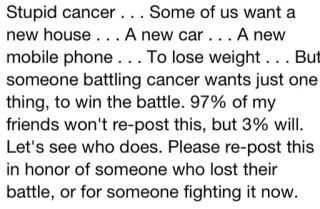A friend posted this image on his Facebook page the other day, and I complied with the request to re-post it on my wall. In my accompanying comment, I noted that although I often write about cancer-related topics, I sometimes get lost in the all the data.

In other words, I need the occasional reminder that there’s always a person behind the numbers. That’s a sobering reminder for anyone, much less a medical writer. On a typical work day, I may find myself writing a press release about an upcoming data presentation at a medical conference, or a newsletter about a recent research advance, or a storyboard for a sales training module on a new chemotherapeutic agent. In each case I must dive deep into the data, teasing out details about complete response versus partial response, Kaplan-Meier survival curves, mechanisms of action, or the purported roles of various proteins in oncogenic signaling. While I pride myself on summarizing such information in a way that is appropriate and accessible to both professional and lay audiences, I still need to keep asking myself what it all means to the person living with the disease. After all, the patient is a person, not a number. Even someone who loses one’s battle with the disease is a person, not just a statistic. That’s true for all diseases, not just cancer, although oncology is a branch of medicine with a particularly dense thicket of numbers and other technical data that one must wade through in order to reach the requisite level of understanding. That process requires an almost single-minded concentration, as any distraction can throw even the savviest writer off course. However, even when the topic has been mastered (and some topics defy mastery), the patient may get lost in the shuffle.
This is the first installment in what I hope becomes a regular series of blog postings about medical writing, the freelance life, and other topics I find interesting and/or pertinent to my professional life. I have been considering starting a blog for quite some time, but I kept telling myself I lacked both the time and the inspiration. I thank my Facebook friend for yanking my head out of the clouds and reminding me why I chose this field. I dedicate this first post to the person behind the numbers: the person who’s actually living with the disease, whether it’s cancer, AIDS, diabetes, Parkinson’s, asthma, or any condition I’ve written (or have yet to write) about. I hope I do justice to your struggle.

